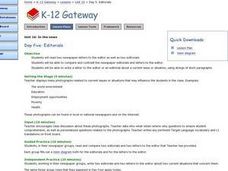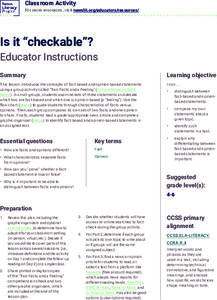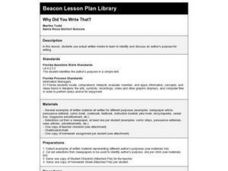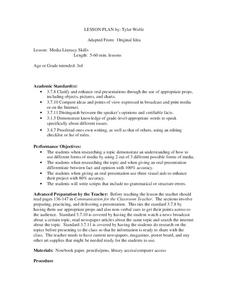Curated OER
During Reading Strategy: Literary Newspaper
Add some writing to your class's reading of Cold Sassy Tree! With this plan, readers assume the role of journalist and create a segment of a paper with their peers. Suggested segments are included, and a worksheet dividing the text into...
Curated OER
A Way with Words
How do facts and opinions impact the news? After reading "How to Cover a War" from the New York Times, middle schoolers evaluate the claims in the article. They also consider the media's responsibilities in reporting during wartime....
Curated OER
I Hate to Complain but your Cheese Stinks
Students read and discuss the "fractured" fairy tale "The Stinky Cheese Man". They imagine that they are in the fairy tale and write a letter of complaint concerning the Cheese Man and how he stinks up the town.
Curated OER
What Is Your Favorite Place?
Good writing can come from personal places. Budding online authors read an excerpt from a narrative-style newspaper article and then respond to several related writing prompts. They compose blog responses that use vivid imagery to...
Media Smarts
The Citizen Reporter
Ripped from the headlines! Discuss topical social issues like racism, discrimination, and diversity while exploring the concept of citizen journalism. Begin with a professional-looking presentation on the history of citizen journalism....
Curated OER
Separate But Equal Opinions
High schoolers examine the ways in which editorials and Op-Ed pieces respond to current events. They write editorials in response to news items from the New York Times.
Curated OER
Editorial Writing: What's On Your Mind
Students write an editorial column for a newspaper. For this journalism lesson, students discuss and analyze editorials in print and broadcast media. Students will compare the differences in these two formats of editorial pieces and then...
Curated OER
Editorials
Students investigate editorials. In this literacy critical thinking instructional activity, students compare and contrast two newspaper editorials and two letters to the editor by completing a Venn diagram. Students work in groups to...
Curated OER
Fact and Opinion
Students determine the difference between fact and opinion. They identify facts and opinions in a report. Students discuss the porportion of fact and opinion in a report. Students write a profile of the place they live and evaluate facts...
News Literacy Project
Is It “Checkable”?
Upper elementary scholars test their checking skills with a lesson that challenges them to distinguish between fact and opinion. First, the class takes part in a discussion regarding a helpful flow chart. Next, learners follow the flow...
Benjamin Franklin Tercentenary
Reading the Work of B. Franklin, Printer
Placing Ben Franklin’s ideas about a free press next to those embodied in the First Amendment sheds light on both. Learners interpret and compare two primary sources and then examine them in the light of a contemporary survey about...
Curated OER
Writing a Letter to the Editor
Learners examine the structure and elements of a letter to the editor. They identify letter elements, read and discuss newspaper letters, and write and submit a letter to a local newspaper.
Curated OER
Persuasive Writing Lesson Plan: Dress Codes
Students examine the pros and cons of the implementation of public policy matters and the specific issue of dress codes. They develop a list of pros and cons of a school dress code, examine and discuss a local editorial newspaper page,...
Curated OER
Why Did You Write That?
Second graders use actual written media to identify and discuss an author's purpose for writing. They identify the author's purpose in a selection from the newspaper, and write a short description of how they came to their conclusion.
Curated OER
Media Literacy Skills
You're on camera! Third graders find a news story and research it to get more information. Everyone uses their found information to write a script and create their own news broadcast!
Curated OER
Plagiarism in the Real World
How would you feel if someone plagiarized your work? After class members turn in an assigned newspaper article, you rewrite the piece using elements of their writing. Then you claim you will be selling the story and that you will profit...
Curated OER
Persuasive Elements
Investigate letters to the editor and their persuasive qualities. Break your class into reading groups and give each one a different article. As they read, they complete a graphic organizer to record their thoughts and opinions. There is...
Teachers Network
Witness for the Prosecution: Online Newspaper
Agatha Christie's Witness for the Prosecution becomes the text for an online newspaper activity. Young journalists craft news, features, obituary, and opinion articles based on the characters and events in the play.
Curated OER
Opinion/Facts: letters to the editor and endorsement
In this opinion and facts worksheet, learners write the opinion and facts of letters to the editor that are for and against a candidate running for office. Students also write the propaganda technique used and example of an endorsement...
Curated OER
Fighting Fake News
Fake news. Alternative facts. Internet trolls. In an age of Newspeak, it's increasingly important to equip 21st century learners with the skills needed to determine the legitimacy of claims put forth on social media, in print, and in...
Curated OER
It's Your Opinion
Students view "Inkheart: Speak Your Mind" by Cornelia Funke. They read several letters to the editor of a local newspaper and underline the 'opinion' portions of the letters. They discover how a literary selection can expand personal...
Curated OER
How To Write Good Letter to the Editor
Students discover how to write a letter to the editor that would be good enough to be considered for publication. They include her or his opinion about the story, share a story of a similar experience to the author's or offer advice to...
Royal Conservatory of Music
The Anti-bullying Magazine
Get the word out about friendship, support, and a safe school community with a media literacy lesson about bullying. Young journalists investigate instances of bullying and take descriptive pictures as they compile a magazine to fight...
Curated OER
Voter Fraud: Are Ghosts Going To The Polls
Students research background material about voting in their community. They interview local/county election officials to see what is going on in the community. They also interview teachers, and students to determine if they are newly...

























